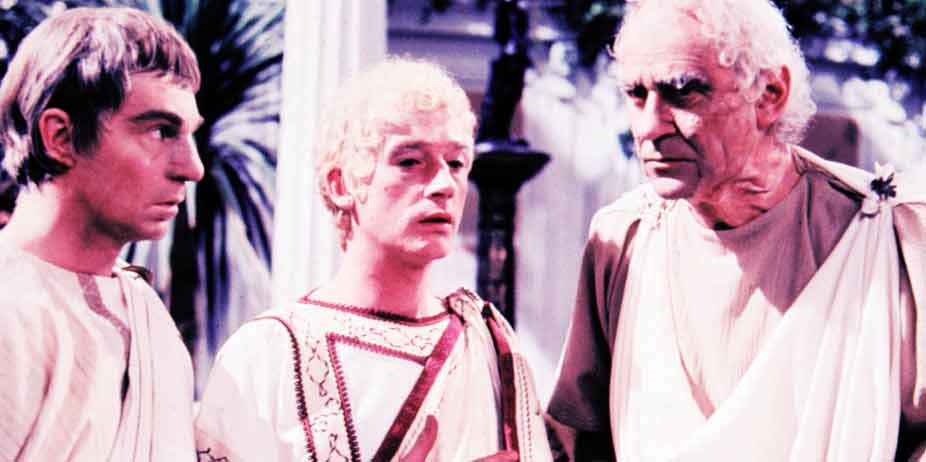I, Claudius (1976)
This twelve-hour miniseries is still considered by many to be one of the greatest TV films ever produced. Based off two novels and meticulously researched, although it has dated effects and often undesirable implications, it's not difficult to see why.
Stammering, lame Emperor Claudius (Derek Jacobi) is nearing the end of his life and desires to write a full history of his tyrannical and often diabolical family. Thus, his story opens some years before his birth, during the reign of Augustus (Brian Blessed). The temperamental emperor is married to the powerful and manipulative Livia (Sian Phillips), who is determined to see her son Tiberius (George Baker) on the throne at any cost... in spite of Augusts' intense dislike for his stepson. Before she can maneuver the young man onto the throne, she must remove Augustus' own children!
Many marriages, divorces, and scandals follow as Livia poisons her son's way to the throne, making powerful enemies along the way... including Tiberius himself. Little does she know the generations to follow will prove even more dangerous than she is... from the viciously cruel and mentally unstable Caligula (John Hurt) to the untalented Nero. But a seer has promised her that one will rise to defend their memory, her least-favorite grandson, Claudius, whom she considers to be a fool. But is he, or has he merely taken the advice of his brother and friend Herod Agrippa (James Faulkner)... and pretends to be one, simply to survive the murderous intentions of his extended family?
For any student of Roman history, this is a memorable experience... and for anyone unfamiliar with the descendants of Augustus, it's a great crash course in all the vile, reprehensible members of the imperial family. Its one fault is that at times, if you know nothing of the period or its participants, it's hard to keep all the family members and how they're related to one another straight! You almost need a family tree in order to keep up with who is in line for what authority and how they're dealt with (fortunately, the DVD has one!). Purely from a cinematic perspective, the series does what few accomplish, and deal with diabolical historical events and personalities with wit and sarcasm. It's funny at times, while being at the same time truly horrific (this is particularly true when it comes to the reign of Caligula).
Plus, the acting is fantastic. Jacobi is at his finest, in a truly difficult part (he wound up having a hard time shaking the six-month stammer). Hurt is also memorable as Caligula -- in his life as much as his death. The entire production is dated and has a stagey feeling. There's not much music and I was surprised at how liberal the content can be at times, considering the censorship issues of the era. Apparently, they allowed for artistic nudity (of which there's quite a bit) but not sexual content or extreme violence. That, combined with the truly lecherous implications throughout (of rape, seduction, incest, and abuse) make it difficult for me to recommend to more conservative audiences.
Sexual Content:
6 episodes feature nudity (either backside or upper female); sexual conversations and references are made; a woman challenges a whore to a contest to see who can "wear out" the most men in an afternoon (the event happens off-screen); references and implications of extra-marital affairs, incestuous relationships (a brother and sister kiss, and she carries his child; a mother intimates she'll sleep with her son and he kisses her); a man cross-dresses to dance for others; a cross-dressing man chases another man around a room and they kiss; Caligula gives Tiberius a pornographic scroll (the drawn images of sexual deviancy are shown briefly).
Language:
Numerous uses of "whore" and mild profanities and insults.
Violence:
Men are stabbed, poisoned, and smothered, often with little to no blood. It's implied a man cuts a child from a woman's womb and consumes it (blood on his mouth, her screaming until she dies off-screen).
Other:
Many references to pagan deities and becoming gods, as well as ancestry worship.

